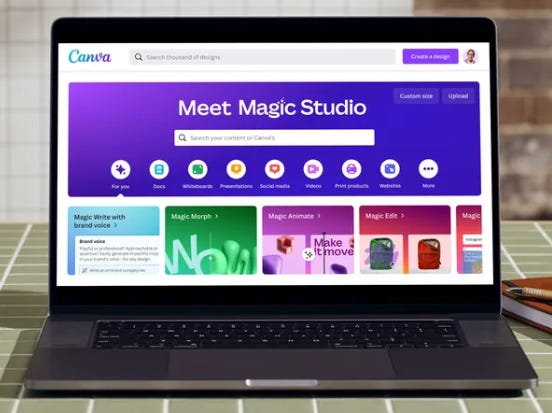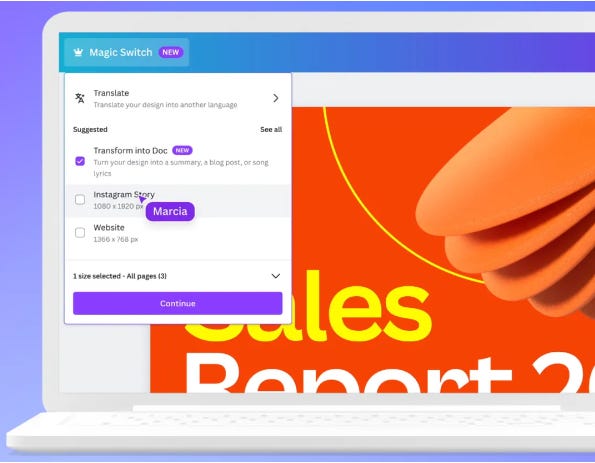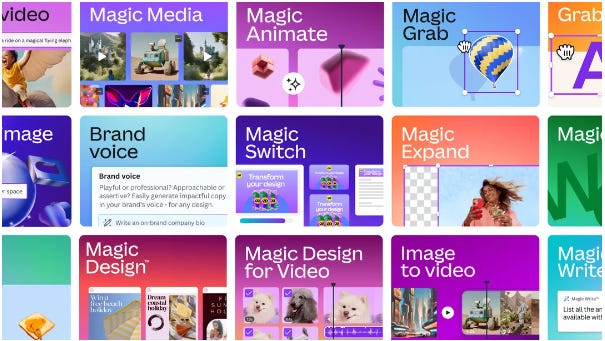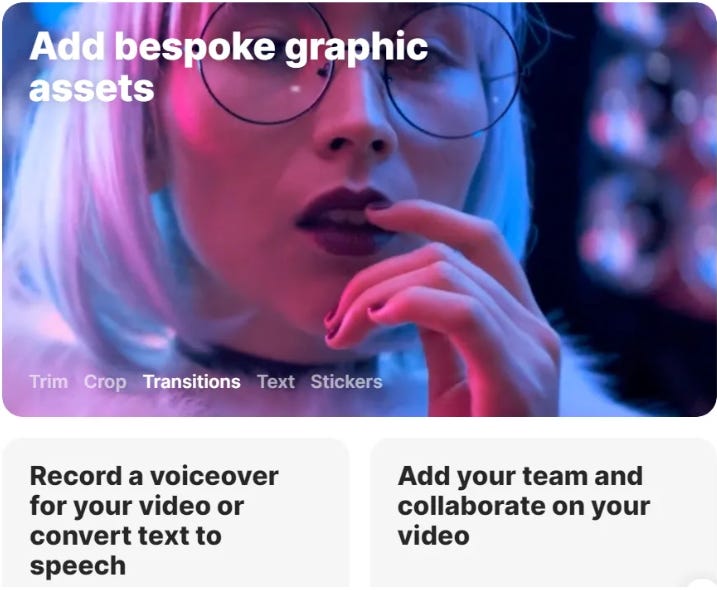Canva Rolls Out Magic Studio, an AI-Powered Suite of Design Tools
Canva Just Made Adobe Shake In Its Boots with This Insane New AI Suite
Design platform Canva recently unveiled Magic Studio, a comprehensive set of AI-powered creative tools aimed at streamlining and automating laborious design tasks. This launch comes as part of Canva's 10th anniversary celebration and represents the company's latest move to position itself as a formidable competitor to established players like Adobe.
The Magic Studio suite provides both organizations and individual users with new ways to quickly generate visual content using AI. The star of the show is Magic Switch, which lets designers instantly convert an existing layout into a different format like a blog, email, or social media post. This automates what is normally a tedious process of manually adapting designs for different mediums and channels. Users can also get their content automatically translated into over 100 languages with the click of a button.
Complementing Magic Switch, Canva has upgraded its Magic Media feature (previously called text-to-image) to now generate short videos from text prompts or uploaded images. The videos can be used within Canva or exported for external projects. Magic Media still provides AI-powered image generation, with expanded style options. Those interested in exploring other generative AI apps can also now access OpenAI's DALL-E and Google's Imagen from Canva's marketplace.
On the photo editing front, Magic Grab can automatically select and separate subjects from their backgrounds for easier editing and manipulation. Magic Expand extrapolates beyond an image's original boundaries to expand its dimensions, similar to Photoshop's new Generative Expand capability.
Underpinning these new creative tools is Canva's commitment to AI safety and ethics. The company is launching Canva Shield, which includes safety controls and administrator oversight options to prevent misuse of the AI capabilities. There is also free AI indemnification provided to enterprise customers.
In terms of compensating the human creators who will be training its AI models, Canva has allocated $200 million over three years for its new Creator Compensation Program. Designers who opt in will get an initial bonus and then ongoing monthly payments for the ongoing use of their content. While specific payment figures are undisclosed, compensation is said to be based on factors like the volume and frequency of content usage.
Notably, Canva states that its new Magic Studio tools have not been developed using data from Canva contributors. However, the company is updating its terms and auto-opting in existing creators, with a 30-day window to opt out if they prefer. This move aligns with Adobe's recent roll out of its own compensation initiative for Stock contributors whose work helps train Adobe's AI features.
Canva's Challenging Adobe's Creative Software Dominance
With Magic Studio coming on the heels of its recent visual productivity suite launch and AI branding management tools, Canva seems intent on taking on Adobe's long-standing dominance in creative software.
Unlike Adobe's professional design suites with steep learning curves, Canva has found immense popularity by targeting novice users. Its free, web-based interface is intuitive and approachable for non-designers. Canva hit 16 million paying subscribers and 150 million users worldwide this year.
Now, by infusing its platform with sophisticated AI capabilities, Canva stands to become even more enticing for professional designers, marketing teams, and creatives. Magic Studio will eliminate many of their most tedious workflows and allow them to focus on higher-value creative challenges.
For its part, Adobe has been actively enriching its own offerings with AI under the Adobe Sensei brand. This includes additions like automatic image masking, intelligent reframing suggestions, and the aforementioned Generative Expand. However, Canva's tools seem more comprehensive and purpose-built for AI-enabled content creation from the ground up.
Adobe may need to rethink its strategy to fend off Canva's appeal, especially among the growing base of hobbyist creators and entrepreneurial one-person creative shops. Canva's model of affordable, simple tools paired with powerful AI could pose a real threat to Adobe's market share in the long run.
AI's Double-Edged Sword
On one hand, Magic Studio presents clear productivity benefits for Canva users who can now accomplish in moments what used to take hours or days of manual work. This allows them to create more content faster.
However, critics argue that leaning too heavily on AI has its downsides. Overuse of generative design tools could deskill creatives and erode fundamental composition, typography, and layout skills. Furthermore, the unique human creative vision risks being diluted by over-reliance on AI.
Others contend that AI-generated content floods the market, making it harder for human creators to compete and get paid fair rates for original work. Some designers feel strongly that feeding their work into AI systems for training, even in exchange for compensation, indirectly undermines their profession.
For organizations like Canva and Adobe, selling convenient AI tools provides a major new revenue stream. But the long-term impacts on individual creators, the job market, training and education, and society's concept of creativity and authorship remain open questions.
Maintaining Transparency and Control
To its credit, Canva seems to recognize valid concerns around AI and is taking steps to provide transparency and user control.
The opt-in model for its Creator Compensation Program, while not perfect, does represent a better approach than using creators' work without permission. Canva Shield also empowers administrators to monitor and govern usage, while AI indemnification for enterprises mitigates legal risks.
As AI capabilities evolve at a breakneck pace, companies integrating these tools have a responsibility to carefully consider the implications. Offering options and safeguards is important, but the onus ultimately falls upon individuals to use the technology judiciously.
Striking the ideal balance will be an ongoing process as norms around acceptable versus harmful applications become established. For now, Canva users can feel reasonably empowered thanks to the level of transparency and control the company has enabled.
The Road Ahead
With the launch of Magic Studio, Canva has staked its claim as a leader in democratizing design through AI. It is surely just the opening salvo in the company's push to be the go-to platform for creatives at all skill levels.
Competitors like Adobe will need to respond to maintain their strongholds among professional users. Meanwhile, creators of all types will continue navigating the promises and perils of increasingly sophisticated generative design.
Canva is sure to have more magic up its sleeves, but the true test will be sustaining rapid innovation responsibly over the long haul. If so, the payoff could be unlocking new creative potential for millions worldwide. The path forward promises to be fascinating for Canva users and observers alike.







